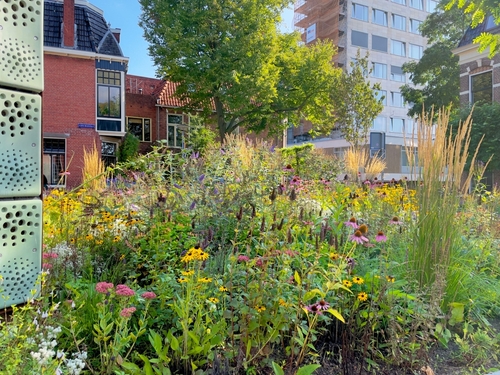The benefits of a green job and the outdoors for people who are neurodivergent


In today’s world, the concept of neurodiversity is gaining much more recognition and acceptance, highlighting the inherent value and diversity of human minds. Neurodiversity refers to the natural variation in the human brain, including conditions such as autism, ADHD, dyslexia, and other neurological differences. Rather than perceiving neurodivergent individuals as having disorders that need to be fixed, neurodiversity emphasises the unique strengths and perspectives they bring to society. Something that lacks much research or resource, and that will be discussed in this blog, is the benefits of a green job for people who are neurodiverse.
Before diving into the benefits for neurodiverse individuals, let’s understand what green jobs entail. A green career is a job, or series of jobs, across an occupational life that contribute to improving the natural environment and addressing climate change. They encompass a wide range of sectors, including renewable energy, energy efficiency, sustainable agriculture, waste management, conservation, and green technology development. The green sector is rapidly expanding, offering a multitude of opportunities for a diverse workforce.
To gain insight into the real benefits of a green job for someone who is neurodiverse, I interviewed Chloe Andrews (she/her) and Jane Firth (she/her) who both work in sustainability roles. Both interviewed have ADHD, which stands for attention deficit hyperactivity disorder. There are many talents and benefits that come with ADHD, however, some of the less helpful traits of this can include, impulsiveness, disorganisation, poor time management skills, difficulty focusing, excessive activity or restlessness, short attention span and many more, although this can vary depending on the individual.
Tell me a bit about your background leading up to your diagnosis of ADHD.
Chloe: I come from a working-class background so I ideally wanted to graduate and build myself a career where I didn’t have to stress about money and could help others, however as a child with undiagnosed ADHD, academia wasn’t always easy, it was difficult to stay focused, I found myself in many different schools as well as home-schooled. I was always interested in sustainability as I loved animals and nature growing up, so at my second attempt at college I studied Animal Management and then I got a degree in Ecology and Conservation. I find that I can focus so much more if I am interested and morally engaged with a topic, but my medication has also helped with focus and enabled me to build a healthier routine, which is something I really struggled with before. Something that is common with ADHD is having a strong sense of what is morally right and wrong, which lends itself well to a career in sustainability.
Jane: I am self-diagnosed with ADHD. Self-diagnosis is quite common for adults who are neurodivergent as the waiting lists for a diagnosis can take around 5 years. It wasn’t until a friend was diagnosed and highlighted that I had all the traits of someone with ADHD that I realised why I had always felt “different”. It made sense once I understood the traits – and realised that most of my friends are neurodivergent, which is a good indicator of your own neurodiverse status.
What do you enjoy most about the sector as someone who is neurodiverse and have you experienced any barriers?
Chloe: I find that sustainability professionals generally have a strong sense of empathy, everyone is supportive and easy to approach, therefore I haven’t really faced any barriers from organisations. I previously worked as a freelancer for a charity which was difficult with my ADHD; tax returns are not ADHD-friendly, it’s harder to get support, and I found it challenging to manage time and inconsistent pay when you’re impulsive with money. I am definitely happier in my role now – I feel well-supported and it’s very varied so I don’t get bored! I find the private sector more suitable for my neurodivergency as it is faster paced and I work well under pressure, deadlines that are far in the future and require long-term time management can be tricky to manage for someone with ADHD.
What would you say the benefits of the outdoors are for someone who is neurodiverse?
Chloe: I grew up in a rural location so I always had a strong connection with nature, I always make time for things like walking, wild swimming and spending time with animals. Access to green spaces has been shown to improve well-being and even life expectancy, and I feel that on days I’m demotivated, spending time in nature helps remind me why I do my job.

Jane: The outdoors is a great way to clear your mind, a closer connection to nature helps your brain calm down and brings you back into yourself when your thoughts are spiralling, which is important especially for those who are neurodiverse and get easily overwhelmed with distractions. I rock climb, and neurodiversity is common in the climbing community. Finding your “tribe” through an outdoor activity is a good way to connect with others that are just like you so you can be yourself without exhausting yourself trying to be “normal”, whilst also experiencing the calming and centring effects of being in nature.
Are you involved in anything at work to support EDI and neurodiversity?
Chloe: I am part of our Diversity, Inclusion and Belonging Scheme, I attend monthly face-to-face meetings and I am a champion for neurodiversity, this means that I am the point of contact if anyone in my organisation needs support. We are pleased to be part of the Hidden Disability Scheme and I wear a nationally recognised lanyard with a sunflower which communicates to others that I have a hidden disability and I might need extra support or time, whether at work or in public spaces.
What tips would you give to employers for supporting staff who are neurodiverse?
Chloe:
Do you have a tip for someone who is neurodiverse?
Chloe: Workplaces legally have to make reasonable adjustments for you as you are protected under the 2010 Disability and the Equality Act, make sure that you ask for any adjustments that you might need, unfortunately, employers don’t always communicate this to their staff.
What would you say the benefits of working in a green job are?
Jane: People like me with ADHD, and other neurodivergent traits, tend to have a heightened sense of justice and fairness. I couldn’t work for an organisation that I didn’t believe in. Concentrating in a job with ADHD can be tricky, there needs to be a drive to do the work as opposed to just doing it to pay the bills. Sustainability is perfect for me as I feel that it is the “morally right” thing to do. This helps me stay driven and focused. Feeling like you’re making a difference is important, people with ADHD generally have a huge attachment to what they do, so working within the green sector for a positive cause helps provide the necessary motivation to do the work.
I currently work from home most of the time. This is great for me as I find open-plan offices difficult to work in. I would need to wear noise-cancelling headphones to concentrate. Online meetings can also be easier than in-person meetings as I sometimes struggle to focus if I can’t fidget, so the opportunity to knit and keep my hands busy whilst I am on a call really helps me avoid distractions. Working from home helps me to manage any distractions and find a way of working that suits me.
How does your workplace support you?
Jane: My workplace is really understanding. Luckily, I work with others that are neurodiverse too so everyone in my team is supportive. For people with ADHD there are some days when you have a mental block and cannot complete anything on your to-do list, sometimes you can’t even read a whole email. This can make my work difficult. I luckily have a really supportive manager with whom I am able to be open and honest and will tell her when I am having an off day, I will then use these days to complete smaller tasks. I always make up for it as I am able to hyperfocus some days and catch up on bigger tasks.
Something that my team do well is that they are forgiving. This is key when working with those who are neurodiverse. There tends to be inconsistency with work output rate and dysregulation of emotions; and you can get forgetful or distracted. It’s important for those around you to be understanding as we can often inflict enough guilt on ourselves so that additional support from your workplace is incredibly valuable. In the past I have struggled with managers who see what I can do on hyperfocus days and can’t understand why I can’t be that good every day. It puts a huge amount of impossible expectations on you, which can make you feel like a failure, so having a manager that understands the ups and downs is incredibly important. Being able to advocate for yourself and your needs is also really important – but often that ability only comes after a diagnosis. Before that you tend to just feel like you’re a failure, and the shame of that feeling prevents the openness needed to self-advocate.
People who work in green jobs tend to be more positive feeling and inclusive and open to the conversations that are necessary to provide the basis of your neurodivergent working relationship.
The powerful testimonies of our interviewees highlight the remarkable benefits of green jobs and the outdoors for individuals who are neurodiverse. Through meaningful employment in environmentally focused careers, they have discovered a sense of purpose, belonging, and personal growth. As we continue to promote the integration of neurodiverse individuals into the workforce, let us not forget the immense value that green jobs and the great outdoors can bring to their lives. By embracing the synergy between environmental stewardship and neurodiversity, we can create a more inclusive and sustainable future for all.
Jane Firth works on the International Sustainability Team at The Body Shop.
You can find out more about Chloe Andrews on LinkedIn.
Support for those with ADHD:
Want to know more about ADHD?